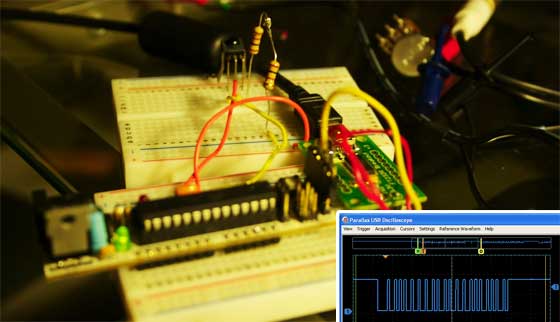Uno de los métodos de comunicación más antiguos y más conocido es el infrarojo. Obiamente lo vemos todos los días en el mando de nuestra televisión, el DVD o incluso en algunos coches. El tema importante está en que por norma generar cada fabricante suele utilizar códigos propios y muchas veces utilizamos mandos universales para manejar una gran cantidad de aparatos con un mismo mando. Os dejo por aqui una interesante implementación de un lector de infrarojos casero utilizando un Arduino y que permite leer incluso los mandos universales.
Codigo y enlace a continuación...
Aqui teneis el código en bruto:
// 0.1 by pmalmsten
// 0.2 by farkinga
#define IR_BIT_LENGTH 12
#define BIT_1 1000 //Binary 1 threshold (Microseconds)
#define BIT_0 400 //Binary 0 threshold (Microseconds)
#define BIT_START 2000 //Start bit threshold (Microseconds)
#define DEBUG 0 //Serial connection must be started to debug
#define IR_PIN 7 //Sensor pin 1 wired through a 220 ohm resistor
#define LED_PIN 9 //"Ready to Recieve" flag, not needed but nice
#define POWER_PIN 11 // the red LED that indicates if the power button is pressed.
int runtime_debug = 0;
int output_key = 0;
int power_button = 0;
void setup() {
pinMode(LED_PIN, OUTPUT); //This shows when we're ready to recieve
pinMode(POWER_PIN, OUTPUT); //This is the "power on" indicator
pinMode(IR_PIN, INPUT);
digitalWrite(LED_PIN, LOW); //not ready yet
Serial.begin(9600);
}
void loop() {
digitalWrite(LED_PIN, HIGH); //Ok, i'm ready to recieve
int key = get_ir_key(); //Fetch the key
digitalWrite(LED_PIN, LOW);
do_response(key);
delay(200);
}
void do_response(int key)
{
switch (key)
{
case 1437:
Serial.println("toggle debug pulse");
runtime_debug = 1 - runtime_debug;
break;
case 1498:
Serial.println("Toggle key output");
output_key = 1 - output_key;
break;
case 1429:
Serial.println("Power");
power_button = 1 - power_button;
if (power_button)
{
digitalWrite(POWER_PIN, HIGH);
}
else
{
digitalWrite(POWER_PIN, LOW);
}
break;
case 1424:
Serial.println("Channel Up");
break;
case 1425:
Serial.println("Channel Down");
break;
default:
if (output_key)
{
Serial.print("Key ");
Serial.print(key);
Serial.println(" not programmed");
}
break;
}
}
void read_pulse(int data[], int num_bits)
{
for (int i = 0; i < num_bits; i++)
{
data[i] = pulseIn(IR_PIN, LOW);
}
}
void pulse_to_bits(int pulse[], int bits[], int num_bits)
{
if (DEBUG || runtime_debug) { Serial.println("-----"); }
for(int i = 0; i < num_bits ; i++)
{
if (DEBUG || runtime_debug) { Serial.println(pulse[i]); }
if(pulse[i] > BIT_1) //is it a 1?
{
bits[i] = 1;
}
else if(pulse[i] > BIT_0) //is it a 0?
{
bits[i] = 0;
}
else //data is invalid...
{
Serial.println("Error");
}
}
}
int bits_to_int(int bits[], int num_bits)
{
int result = 0;
int seed = 1;
//Convert bits to integer
for(int i = 0 ; i < num_bits ; i++)
{
if(bits[i] == 1)
{
result += seed;
}
seed *= 2;
}
return result;
}
int get_ir_key()
{
int pulse[IR_BIT_LENGTH];
int bits[IR_BIT_LENGTH];
do {} //Wait for a start bit
while(pulseIn(IR_PIN, LOW) < BIT_START);
read_pulse(pulse, IR_BIT_LENGTH);
pulse_to_bits(pulse, bits, IR_BIT_LENGTH);
return bits_to_int(bits, IR_BIT_LENGTH);
}
Y aqui una segunda versión del código mucho más sencillo
#define BITS_PER_MESSAGE 12
#define B_1 1000 //1.2 milliseconds
#define B_0 400 //0.6 milliseconds
#define START_BIT 2000 //making it a little shorter than the actual 2400
#define IR_PIN 2
//find the threshold time b/w the two pulse sizes
#define BIT_THRESH B_0+((B_1-B_0)/2)
void setup() {
pinMode(IR_PIN, INPUT);
delay(1000);
Serial.begin(9600);
Serial.println("Ready...");
}
void loop() {
//int where we are storing code, must start at 0
unsigned int code = 0x00;
Serial.println("Waiting for first pulse");
//block until start pulse
while (pulseIn(IR_PIN, LOW) < START_BIT) {}
//read in next 12 bits shifting and masking them into the unsigned int 'code'
//remeber boolean is basically 0 [false] or 1 [true]
for (byte i = 0; i < BITS_PER_MESSAGE; i++) {
code |= (pulseIn(IR_PIN, LOW) > BIT_THRESH) << i;
}
Serial.println(code);
delay(500);
}
Enlace original: Radioshack Infrared receiver


 Extraño y espectacular instrumento de música MIDI creado con Arduino
Extraño y espectacular instrumento de música MIDI creado con Arduino
 Cómo enviar y recibir SMS con Arduino y módulo GSM
Cómo enviar y recibir SMS con Arduino y módulo GSM
 Gaita MIDI casera con Arduino
Gaita MIDI casera con Arduino
 Alimentador automático para gatos con Arduino impreso en 3D
Alimentador automático para gatos con Arduino impreso en 3D
 Cómo utilizar Arduino Serial Plotter
Cómo utilizar Arduino Serial Plotter
 Vúmetro digital con Arduino y pantalla OLED
Vúmetro digital con Arduino y pantalla OLED